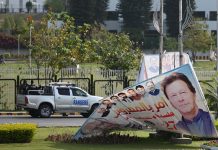
The Chief Electoral Officer announced on August 17 that an ordinarily residing person can now become a voter in J-K. Afterwards, at an all-party meeting organised by PAGD, eight parties vowed to fight against the govt ‘bid’ to snatch away the rights of people of J-K, writes Riyaz Wani
Kashmir is in the middle of a new political controversy. And it started with the chief electoral officer (CEO) Hirdesh Kumar Singh saying on August 17 that the special summary revision of electoral rolls in Jammu and Kashmir that started in July is likely to add around 2.5 million voters.
Singh explained that the number of voters was expected to increase because the exercise to update the electoral rolls was being carried out after a gap of three years. “Post abrogation of Article 370, an ordinarily residing person can become a voter in J&K to exercise his right to franchise,” he said.
Currently, an estimated 7.8 million people are enrolled as voters in the union territory.
Singh said that a person should be ordinarily residing in the UT for him to become a voter. “The electoral roll officer (ERO) and assistant ERO shall be the authority to take the call…. The persons could be ordinarily residing for a job, business, labour work, education etc,” he said. “Therefore, to become voters, people don’t need to be permanent residents of J&K and they do not need to be domiciled here as well.”
The CEO’s assertions have triggered a political storm in Kashmir, with the regional parties seeing it as an effort to alter the demographic character of the union territory. On August 22, the People’s Alliance of Gupkar Declaration (PAGD) held an all-party meeting which was incidentally also attended by Shiv Sena.
Eight political parties attended an all-party meet which was held at Dr Farooq Abdullah’s residence. The parties which took part in the meeting were National Conference, Congress, Peoples Democratic Party, Awami National Conference, CPI(M), JDU, Akali Dal and Shiv Sena.
“The identity of Kashmiris, Dogras, Sikhs etc is under attack and if this decision is taken, it will make sure that outsiders control the assembly in Jammu and Kashmir, and we don’t accept this decision at all,” the PAGD chief Dr Farooq Abdullah said.
“It is not about Farooq Abdullah or any other leader alone but about the collective fight of people of Jammu and Kashmir. If tomorrow, Farooq Abdullah is no more, someone else from us will lead this fight for the genuine rights of the people of Jammu and Kashmir,” Abdullah added..
He also voiced apprehensions that the decision to add “ordinary residents” to the voters’ list will make the outsiders in the UT further vulnerable.
“We also think that the centre is making outsiders in the valley soft targets after coming up with such decisions,” Abdullah said.
Shiv Sena leader Manish Sahni, who for the first time attended the PAGD meet, said this was an issue of the people of Jammu and Kashmir and not of any political party. “If the situation demands, Shiv Sena will hold protests all across the country against the centre’s decision through which they want to snatch the rights of people of Jammu and Kashmir,” he said.
However, the People’s Conference led by Sajad Lone and the Apni Party headed by the businessman-turned-politician Altaf Bukhari didn’t attend the all-party meet. Lone held a separate press conference, though.
“We will wait till 1st October when the draft electoral rolls are published. If there is any wrongdoing, we will hit the streets, not only here but in front of all constitutional institutions of the country like Parliament,” Lone said. “This battle cannot be fought here… we have to make people of India aware about what is happening.”
Government’s clarification
In response to this, the Jammu and Kashmir government on Saturday clarified that media reports about the addition of 25 lakh voters, including outsiders, is a “misrepresentation of facts by vested interests”.
It said that revision of electoral rolls will cover the existing residents of Jammu and Kashmir and the increase in numbers will be due to those voters who have attained the age of 18.
But the clarification has not satisfied the political parties who wonder how the numbers have risen so steeply since the abrogation of Article 370 in August 2019.
“We had District Development Council elections in 2020. How did the numbers change so drastically,” former J&K Chief Minister Omar Abdullah said in an interview to a television channel.
But no party in J&K thinks that the centre could be dissuaded from adding the voters to the electoral rolls and suspect that the larger design is altering the demographic profile of J&K.
“This will change everything. It will in one fell swoop dilute the Muslim majority character of J&K,” said a political analyst on the condition of anonymity. “Outsiders will be instrumental in electing the J&K Government. This will further disempower the locals.”
J&K population statitics
With a population of around 13.6 million, J&K, according to Census 2011, has 68.3 percent Muslim population, while Hindus constitute 30 percent, Sikhs 2 percent and Buddhists, who inhabit the separated Ladakh region, a little more than 1 percent. The census shows the population of Kashmir as 69,07,623, Jammu as 53,50,811 and the now separated Ladakh as 2,90,492.
But when broken down into two regions – Kashmir and Jammu – a different picture emerges. Kashmir’s population of around 70 lakh is over 97 percent Muslim, with the remaining 3 percent comprising Kashmiri Pandits and Sikhs. In contrast, Jammu’s population of more than 53 lakh comprises 65 percent Hindus, 31 percent Muslims and 4 percent Sikhs.
The demographics of the majority of the Assembly constituencies in Kashmir Valley favours the majority community as all 47 constituencies are Muslim-dominated. Muslims were in majority in around 17 of 37 constituencies of Jammu.
Delimitation exercise
Aggravating the fears in the Valley, the recently concluded delimitation exercise has already awarded six out of a total of seven new seats to Jammu division. It has also redrawn the boundaries of the electoral constituencies to suit what political opponents say is the ideological agenda of the BJP. The Commission has thus been accused of gerrymandering to reduce the electoral weight of the Muslim majority constituencies.
The addition of new seats has taken the total Assembly constituencies in Jammu and Kashmir to 90. The number of seats in Jammu division has increased from 37 to 43, while the number of seats in Kashmir has gone from 46 to 47. This is despite the fact that an estimated 70 lakh people live in the Valley, according to the 2011 census, compared to 53 lakhs in Jammu division.
But add to this, the 25 lakh new voters who come from “ordinary residents” of the UT and the electoral game changes.
“Overnight, Jammu and Kashmir will cease to be India’s only Muslim majority region,” said a local politico not wishing to identify himself. “Muslims will become a minority in their own land.”













